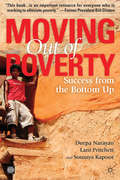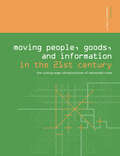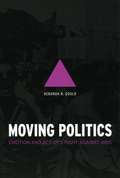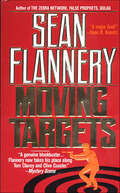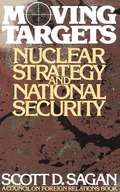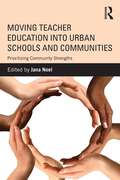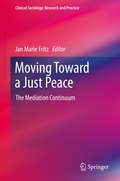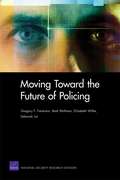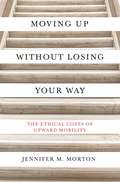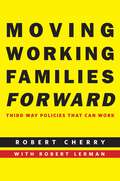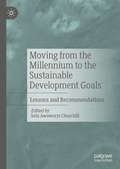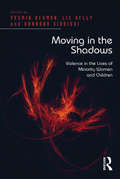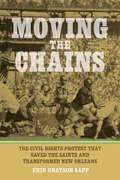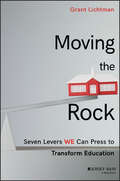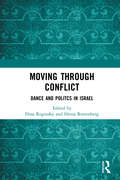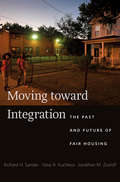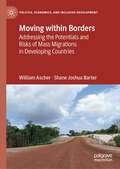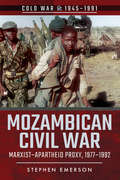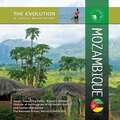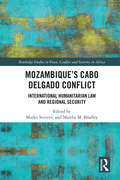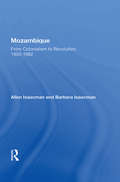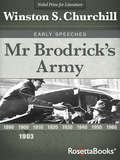- Table View
- List View
Moving Matters: Paths of Serial Migration
by Susan OssmanMoving Mattersis a richly nuanced portrait of the serial migrant: a person who has lived in several countries, calling each one at some point "home. " The stories told here are both extraordinary and increasingly common. Serial migrants rarely travel freely—they must negotiate a world of territorial borders and legal restrictions—yet as they move from one country to another, they can use border-crossings as moments of self-clarification. They often become masters of settlement as they turn each country into a life chapter. Susan Ossman follows this diverse and growing population not only to understand how paths of serial movement produce certain ways of life, but also to illuminate an ongoing tension between global fluidity and the power of nation-states. Ultimately, her lyrical reflection on migration and social diversity offers an illustration of how taking mobility as a starting point fundamentally alters our understanding of subjectivity, politics, and social life.
Moving Out of Poverty: Success from the Bottom Up
by Deepa Narayan Soumya Kapoor Lant Pritchett'No matter if I fall, I get up again. If I fall 5,000 times, I will stand up another 5,000 times.' -- William, a 37-year-old from El Gorrión, Colombia. Why and how do some people move out of poverty--and stay out--while others remain trapped? Most books on growth and poverty reduction are dominated by the perspectives of policy makers and academic experts. In contrast, 'Moving Out of Poverty: Success from the Bottom Up' presents the experiences of poor people who have made it out of poverty. The book's findings draw from the Moving Out of Poverty research conducted in communities in 15 countries in Africa, East Asia, Latin America, and South Asia. The authors synthesize the results of qualitative and quantitative research based on discussions with over 60,000 people in rural areas. They offer bottom-up perspectives on the processes and local institutions that play key roles in escapes from poverty. The study finds that there are no differences in the initiatives taken by the poor, the rich, and the upwardly mobile. What, then, explains the difference in outcomes? The authors demonstrate how-in the face of deep social inequalities that block access to economic opportunities and local democracies-individual initiative and empowerment by themselves are often not enough to escape poverty. This book will be of interest to all concerned with equity in an increasingly unequal world.
Moving People, Goods and Information in the 21st Century: The Cutting-Edge Infrastructures of Networked Cities (Networked Cities Series)
by Richard E HanleyGlobalisation and technological innovation have changed the way people, goods, and information move through and about cities. To remain, or become, economically and environmentally sustainable, cities and their regions must adapt to these changes by creating cutting-edge infrastructures that integrate advanced technologies, communications, and multiple modes of transportation. The book defines cutting-edge infrastructures, details their importance to cities and their regions, and addresses the obstacles to creating those infrastructures.
Moving Politics: Emotion and ACT UP's Fight Against AIDS
by Deborah B. GouldIn the late 1980s, after a decade spent engaged in more routine interest-group politics, thousands of lesbians and gay men responded to the AIDS crisis by defiantly and dramatically taking to the streets. But by the early 1990s, the organization they founded, ACT UP, was no more--even as the AIDS epidemic raged on. Weaving together interviews with activists, extensive research, and reflections on the author's time as a member of the organization, Moving Politics is the first book to chronicle the rise and fall of ACT UP, highlighting a key factor in its trajectory: emotion. Surprisingly overlooked by many scholars of social movements, emotion, Gould argues, plays a fundamental role in political activism. From anger to hope, pride to shame, and solidarity to despair, feelings played a significant part in ACT UP's provocative style of protest, which included raucous demonstrations, die-ins, and other kinds of street theater. Detailing the movement's public triumphs and private setbacks, Moving Politics is the definitive account of ACT UP's origin, development, and decline as well as a searching look at the role of emotion in contentious politics.
Moving Targets
by Sean Flannery“A genuine blockbuster . . . With this novel, Sean Flannery takes his rightful place along such masters as Tom Clancy and Clive Cussler.” —Ed Gorman, Mystery SceneThe Cold War is over—followed by a deadlier menace than the world has ever known. Its codename: Operation Homeward Bound. Deep within the KGB, a dedicated fraternity conspires to restore the power of its fragmented homeland. Brutal, power-crazed, ruthlessly efficient, these renegade agents want nothing less than the destruction of the US.To insure its mission, this sinister coterie will use every weapon available. Torture. Murder. Even the family of a US security adviser.“Not only do Flannery’s spy thrillers have the ring of truth; sometimes they become the truth. Let’s hope Moving Targets remains fiction.” —Dean Ing, New York Times–bestselling author“Full of intriguing, fully drawn characters from both sides of the old cold war . . . [A] clever and thoroughly believable painting of interagency warfare, diverted loyalties, and political confusion in our time. Quite good.” —Kirkus Reviews
Moving Targets: Nuclear Strategy and National Security
by Scott Douglas SaganIn what Stanley Hoffmann, writing in The New York Review of Books, has called a "fine analysis and critique of American targeting policies," Sagan looks more at the operational side of nuclear strategy than previous analysts have done, seeking to bridge the gap between theory and practice.
Moving Teacher Education into Urban Schools and Communities: Prioritizing Community Strengths
by Jana NoelWinner of the 2013 American Educational Studies Association's Critics Choice Award! When teacher education is located on a university campus, set apart from urban schools and communities, it is easy to overlook the realities and challenges communities face as they struggle toward social, economic, cultural, and racial justice. This book describes how teacher education can become a meaningful part of this work, by re-positioning programs directly into urban schools and communities. Situating their work within the theoretical framework of prioritizing community strengths, each set of authors provides a detailed and nuanced description of a teacher education program re-positioned within an urban school or community. Authors describe the process of developing such a relationship, how the university, school, and community became integrated partners in the program, and the impact on participants. As university-based teacher education has come under increased scrutiny for lack of "real world" relevance, this book showcases programs that have successfully navigated the travails of shifting their base directly into urban schools and communities, with evidence of positive outcomes for all involved.
Moving Toward a Just Peace
by Jan Marie FritzMediation, the facilitated discussion of disputes and conflicts, is a flexible approach that can be used at all levels of intervention to move us toward a global peace that is both inclusive and fair. This volume, edited by Jan Marie Fritz, brings together mediators, scholar-practitioners, and a veteran diplomat to discuss the life and times of mediation in very different settings. The 14 chapters include three essays about culture, creativity, and models/theories/approaches. And there are ten chapters about practice: community mediation, mediation by police, special education mediation; interventions on behalf of widows in Nigeria; capacity-building work in Burundi; mediation in Israel; the creative facilitation of meetings; community conferencing; UN Security Council Resolution 1325 (Women and Peace and Security) and the role of civil society organizations in peacebuilding. This volume discusses the expanding roles - from prevention through societal transformation - assumed by mediators and the urgent need for mediators working at different intervention levels to learn from each other. This volume is a must read for scholars, researchers, policymakers, civil society representatives and practitioners with interests in effective dispute and conflict intervention. It particularly is recommended for those managing dispute and conflict intervention processes.
Moving Toward the Future of Policing
by Gregory F. Treverton Elizabeth Wilke Matt Wollman Deborah LaiAdvances in technology and operating concepts are driving significant changes in the day-to-day operations of future police forces. This book explores potential visions of the future of policing, based on the drivers of jurisdiction, technology, and threat, and includes concrete steps for implementation. The analysis is based on a review of policing methods and theories from the 19th century to the present day.
Moving Up without Losing Your Way: The Ethical Costs of Upward Mobility
by Jennifer MortonThe ethical and emotional tolls paid by disadvantaged college students seeking upward mobility and what educators can do to help these students flourishUpward mobility through the path of higher education has been an article of faith for generations of working-class, low-income, and immigrant college students. While we know this path usually entails financial sacrifices and hard work, very little attention has been paid to the deep personal compromises such students have to make as they enter worlds vastly different from their own. Measuring the true cost of higher education for those from disadvantaged backgrounds, Moving Up without Losing Your Way looks at the ethical dilemmas of upward mobility—the broken ties with family and friends, the severed connections with former communities, and the loss of identity—faced by students as they strive to earn a successful place in society.Drawing upon philosophy, social science, personal stories, and interviews, Jennifer Morton reframes the college experience, factoring in not just educational and career opportunities but also essential relationships with family, friends, and community. Finding that student strivers tend to give up the latter for the former, negating their sense of self, Morton seeks to reverse this course. She urges educators to empower students with a new narrative of upward mobility—one that honestly situates ethical costs in historical, social, and economic contexts and that allows students to make informed decisions for themselves.A powerful work with practical implications, Moving Up without Losing Your Way paves a hopeful road so that students might achieve social mobility while retaining their best selves.
Moving Working Families Forward: Third Way Policies That Can Work
by Robert Cherry“Cherry and Lerman have written a compelling book that challenges the orthodoxies of both the political ‘left’ and ‘right’, and that promotes a set of policies to improve the economic status of lower-to-middle income working families. All who care about the well-being of working families will learn a great deal from their analysis.”—Harry Holzer, Professor of Public Policy, Georgetown University “Offers highly sophisticated proposals for helping working families advance in the wake of welfare reform. Cherry and Lerman are very expert, and they write very well.”—Lawrence M. Mead, Professor of Politics and Public Policy, New York University Even as our political system remains deeply divided between right and left, there is a clear yearning for a more moderate third way that navigates an intermediate position to address the most pressing issues facing the United States today. Moving Working Families Forward points to a Third Way between liberals and conservatives, combining a commitment to government expenditures that enhance the incomes of working families while recognizing that concerns for program effectiveness, individual responsibility, and underutilization of market incentives are justified. Robert Cherry and Robert Lerman provide the context to understand the distinctive qualities of Third Way policies, focusing on seven areas that substantially affect working families: immigration, race and gender earnings disparities, education, housing, strengthening partnerships, and federal taxes. Balancing empirical studies with voices of working class people, they offer an important perspective on how public policies should be changed. A timely approach, Moving Working Families Forward makes policy recommendations that are both practical and transformative.
Moving from the Millennium to the Sustainable Development Goals: Lessons and Recommendations
by Sefa Awaworyi ChurchillThis book presents a collection of chapters that examine various dimensions of development. Between 2000 and 2015, the Millennium Development Goals (MDGs) remained the overarching development framework that governed the international development community. After a decade and half of commitment to the MDGs, the framework is widely considered a success, although progress reported across countries has been uneven. The new overarching international development framework may not be successful or present the best opportunities for the desired global change without a better understanding of factors that contributed the most or the least to the attainment of the MDGs. The chapters presented in this book provide discussions and insights into understanding these factors better. They represent a collection of scholarship that address some of the important questions in international development. They adopt a wide range of research methods to provide insight into what works, and what does not, in promoting the stipulated development goals.
Moving in the Shadows: Violence in the Lives of Minority Women and Children
by Liz KellyIn the UK the number of people who came from a minority ethnic group grew by 53 per cent between 1991 and 2001, from 3.0 million in 1991 to 4.6 million in 2001. Whilst much has been written about the impact of these demographic changes in relation to policy issues, black and minority women and children remain under-researched. Recent publications have tended to focus on South Asian women, forced marriage and 'honour' related violence. Moving in the Shadows brings together for the first time in a single volume, an examination of violence against women and children within the diverse communities of the UK. Its strength lies in its gendered focus as well as its understanding of the need for an integrated approach to all forms of violence against women, whilst foregrounding the experiences of minority women, the communities they are part of, and the organizations which have advocated for their rights and given them voice. The chapters contained within this volume explore a set of core themes: the forms and contexts of violence minority women experience; the continuum of violence; the role of culture and faith in the control of women and girls; the types of intervention within multi-cultural and social cohesion policies; the impacts of violence on British-born and migrant women and girls; and the intersection of race, class, gender and sexuality highlighting issues of similarity and difference. Taken together, they provide a valuable resource for scholars, students, activists, social workers and policy-makers working in the field.
Moving the Chains: The Civil Rights Protest That Saved the Saints and Transformed New Orleans
by Erin Grayson SappWe remember the 1966 birth of the New Orleans Saints as a shady quid pro quo between the NFL commissioner and a Louisiana congressman. Moving the Chains is the untold story of the athlete protest that necessitated this backroom deal, as New Orleans scrambled to respond to a very public repudiation of the racist policies that governed the city. In the decade that preceded the 1965 athlete walkout, a reactionary backlash had swept through Louisiana, bringing with it a host of new segregation laws and enough social strong-arming to quash any complaints, even from suffering sports promoters. Nationwide protests had assailed the Tulane Green Wave, the Sugar Bowl, and the AFL’s preseason stop-offs, and only legal loopholes and a lot of luck kept football alive in the city. Still, live it did, and in January 1965, locals believed they were just a week away from landing their own pro franchise. All they had to do was pack Tulane Stadium for the city’s biggest audition yet, the AFL All-Star game. Ultimately, all fifty-eight Black and white teammates walked out of the game to protest the town’s lingering segregation practices and public abuse of Black players. Following that, love of the gridiron prompted and excused something out of sync with the city’s branding: change. In less than two years, the Big Easy made enough progress to pass a blitz inspection by Black and white NFL officials and receive the long-desired expansion team.The story of the athletes whose bravery led to change quickly fell by the wayside. Locals framed desegregation efforts as proof that the town had been progressive and tolerant all along. Furthermore, when a handshake between Pete Rozelle and Hale Boggs gave America its first Super Bowl and New Orleans its own club, the city proudly clung to that version of events, never admitting the cleanup even took place. As a result, Moving the Chains is the first book to reveal the ramifications of the All-Stars’ civil resistance and to detail the Saints’ true first win.
Moving the Rock: Seven Levers WE Can Press to Transform Education
by Grant LichtmanAdvance Praise for Moving the Rock “The future comes at us fast — which means school reformers don’t have time to wait. They need real tools in real time. That’s why Moving the Rock is so important. Grant Lichtman has guidance for anyone — teachers, parents, administrators, government officials — intent on helping young people succeed not ‘someday,’ but today.” — Daniel H. Pink, best-selling author of Drive and A Whole New Mind “Grant Lichtman’s book is a clear and comprehensive guide to the “what" and the “how” of educational transformation. Organized around essential levers for change, it is a must-read for anyone who wants to make a difference in our schools.” —Tony Wagner, Harvard Ilab Expert in Residence, and best-selling author of The Global Achievement Gap and Creating Innovators” “This book gives me hope for a brighter future in education. Despite the dark clouds imposed by misguided policies, Grant Lichtman diligently tells stories of grass-roots innovations in the classrooms and schools all over the world. Moving the Rock is an inspiring call to action for all educators.”—Yong Zhao, Ph.D., Foundation Distinguished Professor, School of Education, University of Kansas “If you have children, or teach children, or want our children to succeed, this is a must-read book. Grant Lichtman throws down the challenge for all of us; that WE can change education, and he shows us just how successful schools everywhere are overcoming change-killing inertia in our schools.” —Todd Rose, best-selling author of The End of Average; Harvard University Moving the Rock: Seven Levers WE Can Press to Transform Educationgives educators, parents, administrators, students, and other stakeholders a clear paradigm for transforming our outmoded schools into schools that will help our children to meet the challenges of tomorrow. It’s no secret that our educational system is stuck. Moving the Rock shows the important roles all of us can play in un-sticking it by moving seven specific levers that will change the focus of education from what we teach to how we learn. Importantly, moving the levers is completely possible today, and in fact is already happening now in many schools. Drawing on research and extensive experience in the education community, Grant Lichtman outlines the seven essential levers that can profoundly change our schools so that we are teaching all our children how to learn, including • Creating the Demand for Better Schools • Building School-Community Learning Laboratories • Encouraging Open Access to Knowledge • Fixing How We Measure Student Success • Teaching the Teachers what They Really Need to Know • and more At the end of each of each chapter there are one or more challenges, ways that all of us can collectively turn the pioneering work of others into transformation for all our schools.
Moving through Conflict: Dance and Politcs in Israel
by Dina Roginsky Henia RottenbergMoving through Conflict: Dance and Politics in Israel is a pioneering project in examining the Israeli–Palestinian conflict through dance. It proposes a research framework for study of the social, cultural, aesthetic and political dynamics between Jews and Arabs as reflected in dance from late 19th-century Palestine to present-day Israel. Drawing on multiple disciplines, this book examines a variety of social and theatrical venues (communities, dance groups, evening classes and staged performances), dance genres (folk dancing, social dancing and theatrical dancing) and different cultural identities (Israeli, Palestinian and American). Underlying this work is a fundamental question: can the body and dance operate as nonverbal autonomous agents to mediate change in conflicting settings, transforming the "foreign" into the "familiar"? Or are they bound to their culturally dependent significance – and thus nothing more than additional sites of an embodied politics? This anthology expounds on various studies on dance, historical periods, points of view and points of contact that help promote thinking about this fundamental issue. It will be of great interest to students and scholars of dance studies, sociology, anthropology, art history, education and cultural studies, as well as conflict and resolution studies.
Moving toward Integration: The Past and Future of Fair Housing
by Richard H. SanderReducing residential segregation is the best way to reduce racial inequality in the United States. African American employment rates, earnings, test scores, even longevity all improve sharply as residential integration increases. Yet far too many participants in our policy and political conversations have come to believe that the battle to integrate America’s cities cannot be won. Richard Sander, Yana Kucheva, and Jonathan Zasloff write that the pessimism surrounding desegregation in housing arises from an inadequate understanding of how segregation has evolved and how policy interventions have already set many metropolitan areas on the path to integration. Scholars have debated for decades whether America’s fair housing laws are effective. Moving toward Integration provides the most definitive account to date of how those laws were shaped and implemented and why they had a much larger impact in some parts of the country than others. It uses fresh evidence and better analytic tools to show when factors like exclusionary zoning and income differences between blacks and whites pose substantial obstacles to broad integration, and when they do not. Through its interdisciplinary approach and use of rich new data sources, Moving toward Integration offers the first comprehensive analysis of American housing segregation. It explains why racial segregation has been resilient even in an increasingly diverse and tolerant society, and it demonstrates how public policy can align with demographic trends to achieve broad housing integration within a generation.
Moving within Borders: Addressing the Potentials and Risks of Mass Migrations in Developing Countries (Politics, Economics, and Inclusive Development)
by William Ascher Shane Joshua BarterThis book highlights the attention that policymakers, activists, and the public should pay to internal migration. Although prominent research has analyzed particular types of internal migration, especially urbanization and internally displaced persons (IDPs), the narrow scope of existing studies cannot capture the overlaps of motivation and circumstances that pose serious policy dilemmas. The book is distinctive in examining the full range of modes and motives of internal migration: state-sponsored or unsponsored, coerced or voluntary, land-seeking or market-seeking, urban or rural, and so on. While approaching internal migration holistically, it also emphasizes how it is distinct from international migrations, especially the central role of the state, whose internal divisions and defensive reactions to challenges often play decisive roles in governing migration. The writing style is geared towards accessibility, making it appropriate for college- and graduate-level students as well as the broader public.
Moyers on America: A Journalist and His Times
by Bill MoyersThe Peabody Award–winning journalist shares stories and insights into our country and the crises we face in an &“eloquent selection of . . . commentaries&” (Publishers Weekly, starred review). Millions of Americans have invited Bill Moyers into their homes over the years. With television programs covering topics from American history, politics, and religion to the role of media and the world of ideas, he has become one of America&’s most trusted journalists. Now Moyers presents, for the first time, a powerful statement of his own personal beliefs—political and moral. Combining illuminating forays into American history with candid comments on today&’s politics, Moyers delivers perceptive and trenchant insights into the American experience. From his early years as a Texas journalist to his role as a founding organizer of the Peace Corps, top assistant to President Lyndon Johnson, publisher of Newsday, senior correspondent and analyst for CBS News, and producer of many of public television&’s groundbreaking series, Moyers has been actively engaged in some of the most volatile episodes of the past fifty years. Drawing from these experiences, he shares his unique understanding of American politics and an enduring faith in the nation&’s promise and potential. Whether reflecting on today&’s media climate, corporate scandals, or religious and political upheavals, Moyers on America recovers the hopes of the past to establish their relevance for the present. &“Not only a good reporter . . . a first-rate storyteller.&” —The Boston Globe
Mozambican Civil War: Marxist-Apartheid Proxy, 1977–1992 (Cold War, 1945–1991)
by Stephen EmersonHow superpower interests and Cold War politics exacerbated a war in Africa that left millions dead or displaced. As the Cold War raged on in the 1970s and 1980s, much of southern Africa, from Angola to Mozambique, became caught up in the superpower competition as local and regional proxies for both Moscow and Washington fought it out on the battlefield. Thus, the struggle to determine the future of a newly independent Mozambique was shaped by multiple factors beyond the control of its people in the course of its sixteen-year conflict from 1977–1992. The longevity and ferocity of the Mozambican war would leave an estimated one million dead, millions more displaced and homeless, and a country in ruins. From the rise of the Resistência Nacional Moçambicana, or Renamo, in 1977 as a Rhodesian weapon against Zimbabwean nationalist guerrillas operating in Mozambique, through South African patronage in the 1980s and to Renamo&’s evolution as a self-sufficient insurgency, the forces of Mozambican nationalism became inexorably intertwined with the geopolitics of the region and the international manifestations of the Cold War. Thus, both government and rebel forces found themselves repeatedly beholden to external interests—be it American, Soviet, Cuban, South African, or Rhodesian—as each sought to advance its own agenda and future vision of the country. However, it would be Mozambicans themselves who spilled their blood in a clash of men and arms that spanned the length and breadth of the country—and ultimately this is their story of sacrifice and triumph. Includes maps, photos, and a glossary
Mozambique (The Evolution of Africa's Major Nations)
by Tanya MulroyIn 1498 Portuguese explorer Vasco da Gama became the first European to set foot on the shores of Mozambique. By the next century, this region along the southeastern edge of Africa had become a colony of Portugal. For almost 500 years the region remained under Portuguese rule, until years of armed conflict and struggle brought independence in 1975. The warfare did not end, however, as the brutal civil war that followed lasted until the early 1990s. Although peace has come to Mozambique, its people continue to face many challenges, including severe droughts and devastating cyclones. However, the fledgling democracy has made economic progress. Today, the government is working to alleviate poverty and increase the standard of living for the people of Mozambique.
Mozambique's Cabo Delgado Conflict: International Humanitarian Law and Regional Security (Routledge Studies in Peace, Conflict and Security in Africa)
by Marko Svicevic Martha M. BradleyThis book uses a multidisciplinary approach to examine the ongoing conflict in Mozambique’s Cabo Delgado province, which has killed thousands and displaced a million people since 2017.The book investigates how the conflict developed, the regional and international responses and its wider implications. From a broad range of African perspectives, the book addresses issues related to the conflict including international humanitarian law, regional security and terrorism. Part I assesses the regional security concerns of the conflict, the success of cross-border counter-terrorism operations and their implications for the southern African region. Part II focuses on the conflict in relation to international humanitarian law. It discusses the Islamic State's presence in the region, the trajectory and issues pertaining to sexual and gender-based violence and the relationship between the conflict and the environment. Finally, Part III examines regional and continental responses to the conflict, from the military intervention by the Southern African Development Community and Rwanda, to the perceived inaction of the African Union.The first comprehensive analysis of the conflict in Cabo Delgado, this book will be of interest to scholars and practitioners of international humanitarian law, security, African politics, war and conflict studies, terrorism and human rights.
Mozambique: From Colonialism To Revolution, 1900-1982 (Ohio Short Histories Of Africa Ser.)
by Barbara Isaacman Allen IsaacmanDrawing on oral interviews as well as written primary sources, the authors of this book focus on the changing and complex Mozambican reality. They focus their study on the changing and complex Mozambican reality to avoid depicting the colonized people as passive victims. .
Mozi: A Study and Translation of the Ethical and Political Writings
by John Knoblock Jeffrey RiegelThis volume is a study and translation of thirty-six chapters in the Mozi that are concerned largely with political and ethical philosophy; the remaining seventeen chapters are related to military defense and logic.
Mr Brodrick's Army (Winston S. Churchill Early Speeches)
by Winston S. ChurchillThis eBook reproduces one of Churchill&’s early political pamphlets—a collection of speeches opposing peacetime military expansion in 1903. In 1903, Winston Churchill was a newly elected Member of Parliament, already making a name for himself with his brash yet brilliant oration and passionate political convictions. During this time, John Brodrick, the Secretary of State for War, proposed an expansion of Britain's peacetime military—a plan which Churchill strongly opposed. Churchill attacked Brodrick's plan in six fiery speeches that galvanized the opposition and left Brodrick politically isolated. When it was first printed, Mr. Brodrick's Army made all six speeches available to the public. Now, with fewer than twenty first editions currently in existence, it is the rarest of Churchill's published works. This eBook edition makes this historically significant document available to readers everywhere.

